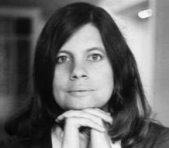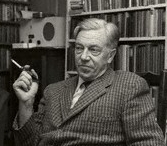 |
 |
Recently my friend Marie and I were marveling at the propulsive quality of AS Byatt’s Possession, a tale of writerly lust intellectual and physical. With this book, Byatt transcends the formal achievements of her earlier work, moving into territory that’s surprisingly immediate and sexy and vital. What, we wondered, caused — or fueled — the shift?
Today Marie points me to some of last year’s news: Evidently Byatt in her youth (above left) had an affair of the mind with her editor Cecil Day-Lewis (above right), former British Poet Laureate and notorious lothario (see, e.g., his protracted liaison with Rosamund Lehmann).
Another writer taken under his wing at Chatto was AS Byatt. In 1964 Chatto published the 28-year-old’s first novel, The Shadow of the Sun, the story of a young girl growing up in the shadow of a dominant father. Day-Lewis was her editor. His admiration for her mind and work, and his efforts in the editing process to bring out the best in her manuscript, spilt over into a more personal attachment.
Byatt, an English graduate from Cambridge who was teaching in the extramural department of the University of London, was at the time married. She responded to Day-Lewis’s advances, though the relationship was not, she later said, consummated.
The Day-Lewises were on holiday at Louisburgh in Ireland in the summer of 1965. When Balcon went up to their room to fetch some cigarettes for her husband from his jacket pocket, at his request, she stumbled across a letter from Byatt. It spoke of romantic afternoons together in Bloomsbury.
Byatt laughs now when asked if she returned Day-Lewis’ affections. “‘He was old enough to be my father,'” she has said. “‘I am sure he thought of it as love, but the fact is love for Cecil was not quite what it is for other men — it turned out, of course, that there were quite a few women in his life.'”
Right, right: But did the experience help inspire Possession?
Elsewhere: Carrie Frye has collected some of Byatt’s comments about the book, and Frank Wilson recalls the author’s revelation that “Alexander Wedderburn, the playwright in The Virgin in the Garden, was based on Day-Lewis.”